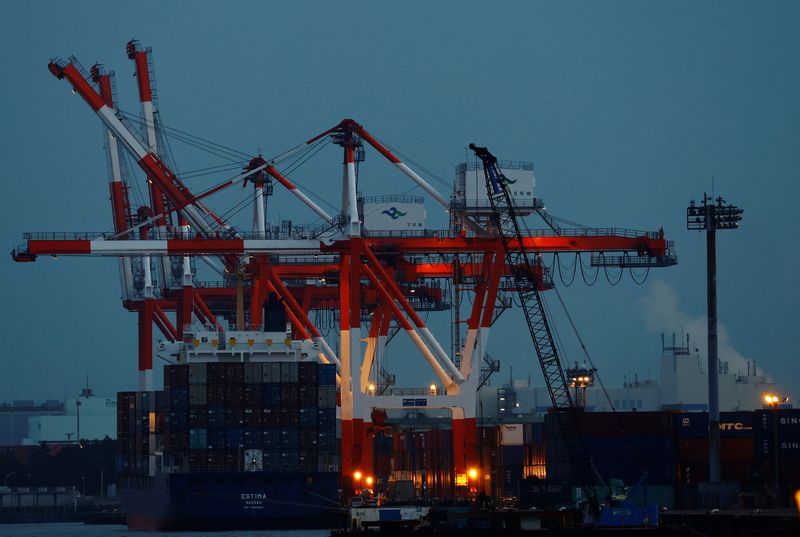By Leika Kihara and Tetsushi Kajimoto
TOKYO (Reuters) -Japan unexpectedly slipped into a recession at the end of last year, losing its title as the world's third-biggest economy to Germany and raising doubts about when the central bank would begin to exit its decade-long ultra-loose monetary policy.
Some analysts are warning of another contraction in the current quarter as weak demand in China, sluggish consumption and production halts at a unit of Toyota Motor Corp all point to a challenging path to an economic recovery.
"What's particularly striking is the sluggishness in consumption and capital expenditure that are key pillars of domestic demand," said Yoshiki Shinke, senior executive economist at Dai-ichi Life Research Institute.
"The economy will continue to lack momentum for the time being with no key drivers of growth."
Japan's gross domestic product (GDP) fell an annualised 0.4% in the October-December period after a 3.3% slump in the previous quarter, government data showed on Thursday, confounding market forecasts for a 1.4% increase.
Two consecutive quarters of contraction are typically considered the definition of a technical recession.
While many analysts still expect the Bank of Japan to phase out its massive monetary stimulus this year, the weak data may cast doubt on its forecast that rising wages will underpin consumption and keep inflation durably around its 2% target.
"Two consecutive declines in GDP and three consecutive declines in domestic demand are bad news, even if revisions may change the final numbers at the margin," said Stephan Angrick, senior economist at Moody's Analytics.
"This makes it harder for the central bank to justify a rate hike, let alone a series of hikes."
Economy minister Yoshitaka Shindo stressed the need to achieve solid wage growth to underpin consumption, which he described as "lacking momentum" due to rising prices.
"Our understanding is that the BOJ looks comprehensively at various data, including consumption, and risks to the economy in guiding monetary policy," he told a news conference after the data's release, when asked about the impact on BOJ policy.
The yen was steady after the data and last stood at 150.22 per dollar, pinned near a three-month low hit earlier in the week.
Yields on Japanese government bonds fell after the data as some traders pushed back bets of an early BOJ policy shift. The benchmark 10-year yield slid 4 basis points to 0.715%. The Nikkei stock average rallied to 34-year highs, with the data further underpinning recent reassurances from the BOJ that borrowing costs will stay low even after ending negative rates.
"Weak domestic demand makes it hard for the BOJ to pivot towards monetary tightening," said Naomi Muguruma, chief bond strategist at Mitsubishi UFJ Morgan Stanley (NYSE:MS) Securities. "The hurdle for ending negative rates in March has risen."
Japan's nominal GDP stood at $4.21 trillion in 2023, falling below $4.46 trillion for Germany to rank as the world's fourth largest economy, the data showed.
CONSUMPTION, CAPEX WEAK
Private consumption, which makes up more than half of economic activity, fell 0.2%, versus market forecasts for a 0.1% gain, as rising living costs and warm weather discouraged households from dining out and buying winter clothes.
Capital expenditure, another key private-sector growth engine, fell 0.1%, compared with forecasts of a 0.3% gain.
Both consumption and capital expenditure shrank for the third straight quarter.
Big companies expect to increase capital expenditure by hefty 13.5% in the year ending in March, a quarterly survey showed. But analysts point to a delay in actual investment due to rising raw material costs and labour shortages.
The most recent machinery orders data, regarded as a leading indicator of capital spending, showed a contraction in November and cast doubt on the BOJ's view that robust investment will underpin the economy.
External demand, or exports minus imports, contributed 0.2 percentage point to GDP as exports rose 2.6% from the previous quarter.
The BOJ has been laying the groundwork to end negative rates by April and overhaul other parts of its ultra-loose monetary framework, but is likely to go slow on any subsequent policy tightening amid lingering risks, sources have told Reuters.
An exit from accommodative policy would come at a time the U.S. Federal Reserve is pausing after aggressive interest rate hikes, and is widely expected to reduce borrowing costs this year.
The International Monetary Fund revised up its global growth forecast in January as the outlook for the United States and China brightened, but warned of risks including geopolitical tensions in the Middle East.
While BOJ officials have not offered clues on when they could end negative rates, many market players expect it to happen either in March or April. A Reuters poll taken in January showed April as the top choice among economists for the negative rate policy to be abandoned.
Some analysts say Japan's tight labour market and robust corporate spending plans are keeping alive the chance of an early exit from ultra-loose policy.
"The (BOJ) has been arguing that private consumption has 'continued to increase moderately' and we suspect that it will continue to strike an optimistic tone at its upcoming meeting in March," said Marcel Thieliant, head of Asia-Pacific at Capital Economics, sticking to his projection the bank will end its negative interest rate policy in April.
